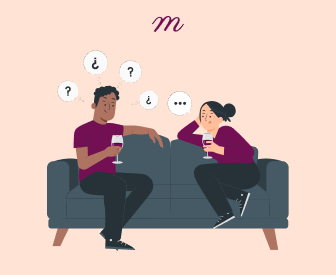Heads-up, What Are We Cooking in Today’s Blog?
Imagine you’re sitting at a cozy café, sipping your favorite drink, and a friend starts telling you about this fascinating guy from ancient Greece: Socrates.
Socrates was a bit of a mystery. He never wrote anything down, and yet, his ideas have traveled through time, thanks to his student, Plato.
Socrates wasn’t there to lecture (just like many professionals nowadays would); he was there to ask questions; big, thought-provoking questions. This method of his, called Socratic questioning, was all about digging deeper and deeper. Instead of just giving answers, he would ask questions that made people think and discover the truth for themselves. It’s like peeling an onion, layer by layer until you get to the core.
Fast forward to today. You might wonder, what can this ancient technique offer to us today? Well, it turns out, a lot!
So, grab another cup of coffee, get comfy, and let’s explore how asking the right questions can make all the difference.
Socratic Questioning Defined
You know, some people make such a huge impact on the world that their influence never really fades away. Socrates is definitely one of those legends and Socratic questioning is just one of the many examples of how Socrates lives on.
We often overlook the art of asking good questions. It’s easy to throw out vague, aimless questions that don’t really get us anywhere, whether we’re in a classroom or a therapy session. It’s like wandering in circles without a map. Socratic questioning comes to solve this problem. It tackles this inadequacy head-on by using a series of focused, open-ended questions that encourage you to think.
Socratic questioning is a time-tested technique for having meaningful discussions that get to the heart of what people truly believe and why.
By engaging in thoughtful questioning and answering without accusation, two or more participants can jointly dig to discover the assumptions and reasoning underlying their stated positions.
Through this questioning process, deeply held views are explored in a disciplined way. By building on each response with the next question, layer by layer what is consciously expressed is linked back to underlying beliefs, whether known or not.
This dialogic approach aims for understanding over debate. When entered into respectfully and with open but inquiring minds, it need not end in changed views so much as changed perspectives, that is: views which now include seeing through another’s eyes what once lay hidden behind their words.
The Philosophy Behind Socratic Questioning
You’re in a conversation where someone keeps tossing open-ended questions your way. Sounds a bit frustrating, right? Well, take a deep breath. It’s not about getting a straight answer; it’s about making you think deeply.
This way of communicating is all about challenging others through thoughtful questioning. There’s often no clear answer, and that’s the point. The aim is to dive deep into what we know (or think we know) about ourselves or any topic at hand.
Teachers, therapists, and even normal people can use this method in their daily lives.
The idea is to nudge someone just a bit out of their comfort zone, making them reflect on their thoughts, behaviors, and feelings.
Socratic Questioning in CBT and Therapy
Socratic questioning is a game-changer in Cognitive Behavioral Therapy (CBT).
Imagine sitting with a therapist who doesn’t just tell you what to think but helps you dig to understand your own beliefs.
In CBT, the goal is often to tweak your thought patterns to improve your emotions and behaviors, as such, Socratic questioning is analogous to a flashlight in a dark room. It helps you see your problems clearly, understand how your beliefs and thoughts are affecting you, and make sense of past events in your life.
When therapists use the Socratic method, they’re not just giving you answers; they’re guiding you to find your own. This approach helps you become aware of the thought processes that keep you stuck and shows you how to change them. It’s like flipping a switch in your brain, allowing you to see things from a new angle and reevaluate your thoughts.
Unlike traditional methods where the therapist might lecture you, Socratic questioning is all about reflective questioning. It’s been proven effective in numerous controlled trials for a variety of psychological issues.
While there’s no one-size-fits-all definition of the Socratic method in CBT, it’s generally about using questions to clarify meaning, elicit emotion and consequences, and gradually create insight or explore alternative actions.
The key here is that the approach is non-confrontational. It’s not about putting you on the spot or making you feel judged. Instead, it’s about guiding you through a process of discovery in a supportive and curious way. This leads to those “aha” moments where things just click.
The Four Stages of Socratic Questioning
Ever had a deep conversation with a friend where you ended up discovering things about yourself you never realized? That’s kind of what Socratic questioning feels like. Here’s how it goes:
Asking Questions:
The therapist starts by asking open-ended questions to gather all the juicy details about what’s on your mind. It’s like when a friend asks, “What’s been going on with you lately?” or “Tell me more about what happened.” The idea is to get everything out in the open so you can see the big picture.
Attentively Listening and Reflecting Back:
Once you’ve spilled the beans, the therapist listens carefully and reflects back what they’ve heard. This isn’t just about nodding along; it’s about showing you that they truly get where you’re coming from. They might say something like, “So, you’re feeling pretty swamped with work and it’s stressing you out. Did I get that right?” This stage is all about making you feel heard and understood.
Providing a Summary of the Information:
Next, the therapist takes all the bits and pieces of your story and puts them together in a neat summary. It’s like when you’re talking to a friend and they say, “Okay, so let me get this straight. You’re stressed because of work, and it’s messing with your sleep and mood. Is that right?” This helps to organize your thoughts and make sure you’re both on the same page.
Asking More Questions to Apply the Answers:
Finally, the therapist asks more targeted questions to help you apply what you’ve discovered to your original thoughts and beliefs. These questions are designed to challenge your assumptions and encourage you to think differently. They might ask, “What makes you think things will always be this stressful?” or “How could you handle a similar situation differently next time?”
The 6 Types of Socratic Questioning
Clarification questions
Ask things like “What do you mean by…?” or “Could you explain that further?” to draw out more details.
Challenging assumptions
Respectfully challenge initial viewpoints with questions such as “Is there another way to look at this?” or “What assumptions are we making?”
Seeking evidence/reasoning
Ask for examples, data, or logical explanations to support positions through questions like “Can you back that up?” or “How do you know that’s true?”.
Considering alternative perspectives
Phrases like “What might someone else think?” or “How else could this be interpreted?” encourage broader analysis.
Exploring implications/consequences
Questions like “What impact would that have?” or “If that were true, then what?” deepen understanding of outcomes.
Probing the question itself or questioning the question
Saying “What do you think my real question is?” or “What else could we be discussing?” can add more depth to the discussion.
To fully explore a topic and advance meaningful discussion through the Socratic method, it is important to employ a variety of questioning styles. No single question type can sufficiently examine an issue from all relevant angles.
Question Type Examples:
Clarification What do you mean by X? Could you explain further? Can you expand that point further?
Challenging Assumptions Is there another way to look at it? What are we assuming? Why do you think that? Are there any assumptions we can take from this question?
Evidence/Reasoning Can you give an example to support that? What’s the evidence base?
Alternative Perspectives What might someone else think? How else could this be seen?
Implications/Consequences What impacts would occur? What are the long-term effects?
Questioning the Question What else could we be discussing? What is the deeper issue?
Application
Here’s an example of how I might apply various Socratic questioning styles in a discussion.
Let’s say we’re discussing the causes of depression.
- For clarification, I ask “When you say it’s caused by stress, what kind of stress are you referring to?”
- To challenge assumptions, I could say “Most experts now believe genetics play a role too. What makes you think stress is the only cause?”
- For evidence, I may ask “Can you point me to any studies that prove stress as the sole cause? I’ve seen research showing chemicals in the brain may also contribute.”
- To explore alternatives, I could ask “How might someone from a holistic health perspective explain depression differently?”
- For implications, a question may be “If it’s ultimately caused by stress, what does that mean for the most effective treatments?”
- Lastly, to probe deeper meaning, I could say “When we talk about ’causes,’ are we really exploring people’s experiences of what seems to trigger their suffering?”
As you can notice, my goal with all questions is respectful exploration, not debate.
So, How Do You Do Socratic Questioning? A Rule of Thumb
Engaging in Socratic questioning is a collaborative effort, involving both teachers and students or therapists and clients. Here are some key points to consider:
- Active Participation: Every participant should contribute actively and help steer the conversation forward.
- Productive Discomfort: Create an environment that encourages productive discomfort, free from fear and panic.
- Open-mindedness: Approach the discussion with an open mind, ready to listen and show understanding.
- No Adversaries: Avoid creating an atmosphere of opposition or playing ‘devil’s advocate’. Focus on mutual understanding and exploration.
Guidance for Effective Socratic Questioning
- For the counselors or teachers
- Plan Questions: Prepare meaningful questions to guide the overall structure and direction of the dialogue without being overly rigid.
- Allow Response Time: Give students or clients enough time to think and respond without feeling rushed.
- Probe Deeply: Use probing questions to delve deeper into the responses provided, encouraging further discussion.
- Encourage Elaboration: Invite participants to elaborate on their thoughts and facilitate self-discovery through thoughtful questioning.
- Stay Focused: Keep the dialogue focused, specific, and clearly worded to maintain clarity.
- Summarize Regularly: Periodically summarize the key points discussed to ensure everyone is on the same page.
- Pose Open Questions: Ask open-ended questions rather than those that can be answered with a simple yes or no.
- Avoid Ambiguity: Re-word or avoid questions that are vague, ambiguous, or too complex for the listener’s understanding.
- Identify a Thought to Target:
- During therapy, many distressing or maladaptive thoughts may surface.
- Focus on one thought at a time to use Socratic questioning effectively, rather than addressing multiple thoughts simultaneously.
- Notice Changes in Effect:
- Pay attention to sudden changes in facial expression, body language, or tone of voice, as they may indicate an important thought.
- When a change in affect is observed, pause the conversation to explore what caused the change.
- Example:
- Therapist: “I noticed your expression changed just now. You were smiling a moment ago, but when I mentioned school, you seemed to get upset. What were you thinking about right then?”
2. Ask Directly:
- Rather than guessing or assuming which thought is most important, simply ask the client.
- Provide a list of thoughts the client has shared and encourage them to select one.
- Example:
- Therapist: “We’ve discussed how your depression brings up thoughts like ‘I’m worthless’ and ‘I’ll never succeed as a teacher.’ Which of these thoughts do you find most distressing?”
For the clients or students
- Participate actively and thoughtfully in the discussion.
- Provide clear and concise answers.
- Be open to exploring your thoughts and feelings honestly.
- Ask questions if you need clarification or further understanding.
- Reflect on the questions asked and take your time to consider your responses.
- Engage in the dialogue with an open mind and a willingness to learn.
- Listen carefully to the questions and feedback from your teacher or therapist.
- Share relevant experiences or examples that can help illustrate your thoughts.
- Stay focused on the topic being discussed and avoid getting sidetracked.
- Be respectful and considerate of others’ viewpoints during the discussion.
Have I Done It Right?
Effective Socratic Questioning:
- Uses Open-ended Questions
- Comes from a place of shared interest in understanding.
- Helps clients view their situation from a different point of view.
- Encourages clients to re-evaluate assumptions that were previously accepted as evidence.
- Introduces new evidence that may challenge existing thoughts.
- Are concise, directed, and clear
- Invite active engagement with a clear rationale behind each question.
- Concentrate on the issue at hand without assuming the client has the answer.
- Neutral, i.e., ensure the questioning does not imply there is a correct or preferred answer.
Mentalyc is by Your Side
Are you longing to spend more quality time with clients instead of manually inputting endless work? Mentalyc is the solution you’ve been searching for.
As a mental health professional, I understand how the tedium of documentation can take its toll. That’s why I recommend Mentalyc.
With Mentalyc, all you need to do is record or describe your sessions as usual. Our intuitive software does the rest, seamlessly converting your audio or written insights into structured, compliant notes with a single click.
This gives valuable time back; time you can use to see more clients, reduce burnout, or simply enjoy a greater work-life balance. The difference Mentalyc has made in my practice is immense. I’m rejuvenated and able to bring my best self to every patient interaction. You might want to consider this as well!
Disclaimer
All examples of mental health documentation are fictional and for informational purposes only.
Why other mental health professionals love Mentalyc

“Do yourself a favor, make your life easier. Use the tools that are readily available … I found Mentalyc to be one of the best tools that I’ve ever used.”
Licensed Marriage and Family Therapist

“For those who have hesitations … It is a lifesaver. It will change your life and you have more time to be present with your patients.”
Licensed Clinical Social Worker

“If I were recommending this software to a colleague, I would tell them that it is the best thing that they could do for their practice.”
Licensed Professional Counselor

“It immediately changed my quality of life, personally and professionally. I went from 3–4 hours a week of notes to 1 hour at most … that alone is invaluable personally and professionally.”
Owner/Independently Licensed Marriage & Family Therapist (IMFT)







